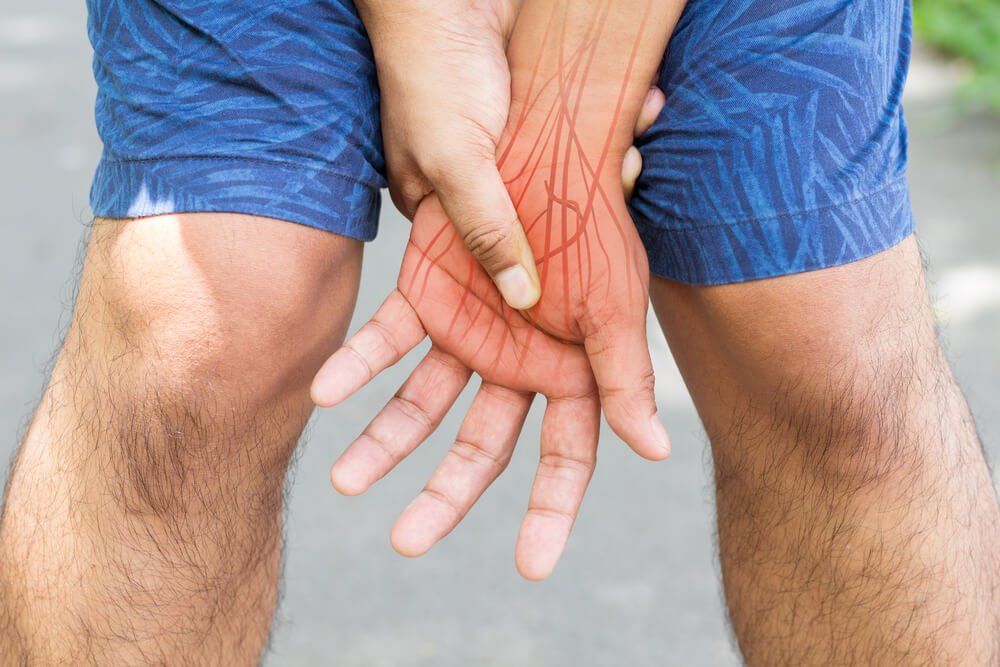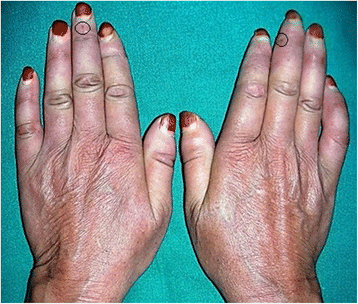What Causes Burning Hands & Fingers?
Burning hands often result from irritated nerves, circulation issues, or overuse. Learn common causes and simple ways to reduce burning and discomfort.
By Dr. M. Zannakis The CarpalRx
Burning hands or fingers often result from irritated nerves, circulation problems, diabetes, or repetitive hand strain. These sensations can also occur with carpal tunnel syndrome or other neuropathies. This guide explains the most common causes, key symptoms to watch for, and practical steps to reduce burning and discomfort.
Table of Contents
- Overview
- Infection
- Allergy
- Reaction to a drug
- Carpal tunnel syndrome
- Treating carpal tunnel syndrome
- Wrist/hand bracing
- Stretching exercises
- Massage
- Neuropathy
- Treating neuropathy
- Erythromelalgia
- Treating erythromelalgia
- Summary
- FAQs
- About
Overview
A burning sensation in the hands can be an unsettling experience. It may feel like heat, tingling, or a fiery discomfort in the palms or fingertips, sometimes accompanied by numbness or pain. Although this symptom can occasionally be harmless or short-lived, persistent or worsening burning may indicate an underlying medical condition that requires attention.
The most common causes of burning hands include
infection, allergic reaction, adverse drug response, carpal tunnel syndrome, neuropathy,
and
erythromelalgia. Each of these conditions affects the body differently, yet they can all trigger a similar burning sensation.
Infections or allergic responses often cause inflammation in the skin or surrounding tissues, leading to localized heat and irritation. Drug reactions can produce similar effects, especially when the body’s immune system is sensitized to a substance.
When the burning originates from within, rather than the skin’s surface, it often points to a nerve-related cause. A prime example is carpal tunnel syndrome, which compresses the median nerve at the wrist, producing tingling and burning in the hand and fingers. Similarly, peripheral neuropathy, frequently associated with diabetes, metabolic disorders, or certain medications, causes nerves to misfire, resulting in burning or electric sensations.
A rare but important condition, erythromelalgia, can also lead to redness, heat, and burning due to abnormal blood flow in the hands.
This article examines these causes in detail, explains how to recognize their distinguishing features, and outlines when professional evaluation is recommended.
1) Infection, drug reaction and allergy
Infection
Do you have an inflamed wound on the affected hand? Then this is the obvious source to check out. If you've tried
topical antibiotics and the burning persists, keep reading!
Did you know drug reactions & allergies
are the most common causes of burning hand sensations?
Drug Reaction
Fiery sensations in your hands can be traced back to drug reactions. If you've recently started a new medication or switched drugs, then investigate this possibility. The likelihood increases if you also have burning in your cheeks or lips. New prescriptions could also be interacting with other medications you're taking. Check for
drug interactions here.
Allergies
Surprisingly, allergies can also cause burning hands or fingers, too.
Food allergy culprits include eggs, milk, nuts, shellfish, soy, and wheat. Insect bites or touching
certain plants also are known triggers.
If you have questions about the above -
ask us! We're here to help.
2) Burning hands due to carpal tunnel syndrome
One of the most common causes of burning hands is a condition called
carpal tunnel syndrome (or sometimes simply called "carpal tunnel"). This is a progressive and painful condition affecting millions. Burning hands sensation due to carpal tunnel can also be accompanied by
other symptoms like
numbness, tingling,
weakness, and
shooting electric shocks. Many sufferers
feel pain (sharp or dull) as well.
If you're tired of reading and simply want to know the probability that you have carpal tunnel, take the Quiz that Dr. Z designed. It's a very useful diagnostic tool that's quick and accurate.
Carpal tunnel syndrome primarily affects the palm surface of the hand and most of the fingertips. The thumb and forefinger are usually more affected. But the little finger is never involved.
Usually, carpal tunnel syndrome appears as a result of performing rapid and forceful hand movements for a long time. But other
harmful activities can also cause this condition.
The harmful activities cause your wrist flexor tendons to get inflamed. When they do, they swell. And that’s when the real problems begin.
The tendons swell inside the wrist joint in a tight space called the “carpal tunnel”. This is a narrow, confined channel through which the tendons and the
median nerve pass.
Unfortunately, the swelling pushes on the median nerve and slowly crushes it inside the wrist joint. This crushing action is what causes the unpleasant sensations.
The most common signs of carpal tunnel syndrome are hand or finger pain, numbness, and tingling. But feeling burning hands and fingers is certainly in the top level of complaints.
Most times, the palm, thumb and forefinger are more involved with burning feelings.
Treating carpal tunnel syndrome
You can treat carpal tunnel symptoms like painful or burning hands or fingers fairly easily -- if symptoms are mild. But if symptoms are in the
severe stage, then it's more difficult to treat.
For most cases of carpal tunnel, symptoms respond very favorably to
bracing, exercise and massage.
You can learn more about treating carpal tunnel syndrome
here. These treatments are outlined below.
Wrist/hand bracing
Brace your hand while you sleep.
And choose a brace that's right for carpal tunnel.
A brace gives your hand the opportunity to rest in its natural and "neutral position". That means there's no stress on the joint. And that rest is most crucial at night.
When we sleep, we unconsciously over-bend our hands. Hyper-flexing and hyper-extending the hand does tremendous damage inside the wrist joint. But a wrist brace prevents that movement while we sleep. That's why it’s the best way to rest your hand at night.
In contrast,
never
wear a brace during the daytime while working with your hands. That's because your hand will subconsciously fight the immobilization - if even a little bit. And that can make healing go a lot slower.
Finally, never wear a compression glove if you have carpal tunnel syndrome. See this explanation why
compression gloves can be harmful.
Stretching exercises
There are 4 Core Stretching Exercises of the fingers and hands to fight carpal tunnel. They loosen tendons and break up restrictions that cause tendon inflammation. Not surprisingly, these 4 stretching exercises are among the most potent carpal tunnel fighters around.
The rate at which stretching exercises relieve painful or burning hands or fingers is related to how often you perform them. The best exercises for carpal tunnel can be found
here.
Massage
Massage of the wrist and forearm is perhaps the most powerful nonsurgical carpal tunnel treatment. By using
myofascial release massage on the wrist and forearm, the actions break apart adhesions and restriction on tendons.
This massage can be performed by a trained therapist or by the CarpalRx (which performs it automatically).
The massage reduces tendon inflammation and swelling. That means pressure on the median nerve is relieved, and so are the painful or burning symptoms.
There are two
other benefits of carpal tunnel massage using myofascial release. First, it promotes
blood flow which is crucial for the healing process. It also facilitates removal of excess
fluid build-up inside the wrist joint. Both of these help the healing process and restore your hand to normal again.
3) Burning hands due to neuropathy
Neuropathy is a
common disorder - especially in diabetic patients. Neuropathy isn't a disease but rather damage that results from a disease, like
diabetes.
Under normal conditions, nerves carry signals from the brain to muscles of the body (motor nerves). Other nerves carry signals of sensation from the body to the brain (sensory nerves). But in some diseases causing neuropathy, those signals become disrupted. It's like having "crossed" signals in electrical wires.
The symptoms of neuropathy depend on which of those nerves are damaged. For instance, motor nerves can produce muscle cramping and weakness.
In contrast, damage to sensory nerves can cause burning hands and feet.
The burning sensation is usually more intense in the evening. Sometimes the burning feelings are accompanied by numbness and sensitivity to touch. That means a light touch can feel like bad pain. For instance, touching your bed sheets at night may feel like getting sharp cuts.
Treating neuropathy
The main cause of neuropathy is diabetes. Therefore, treating the diabetes is paramount to relieve neuropathy symptoms. In fact, simple
blood sugar control is usually enough to allow nerves to recover from any damage caused by diabetes.
Furthermore, if you smoke, then stop. Smoking constricts blood vessels. That means less blood gets to the nerves. If you stop smoking, more blood gets to the blood vessels and they can heal faster. People who have neuropathy and then stop smoking greatly
improve their chances of diminishing neuropathy symptoms.
Enhanced blood flow is also why regular exercise is beneficial. Nerves receive more blood and therefore more oxygen. This helps the nerves heal and reduces any other complications from diabetes.
If you have chronic neuropathy that causes burning hands or feet, you can try taking medications approved by the
Neuropathy Action Foundation. These include:
- Nortriptyline
- Pregabalin
- Gabapentin
- Serotonin-norepinephrine reuptake inhibitors
4) Burning hands due to erythromelalgia
Erythromelalgia (e-rith-row-mel-al-gee-ah) is a disease of the blood vessels. It's relatively rare, affecting
under 10,000 people per year in the USA. Erythromelalgia often occurs with
systemic scleroderma which is an autoimmune disease.
Erythromelalgia symptoms include flare-ups of burning hands and feet. It's less common in the arms, legs, and face. Often, the skin is warm, swollen, and red.
If the cause of erythromelalgia is genetic (or not known) it's called "primary erythromelalgia". If another disease causes it, it's called "secondary erythromelalgia". Secondary erythromelalgia is associated with systemic scleroderma.
The reason scleroderma results in erythromelalgia is not well understood. But
studies show it may be caused by abnormal widening or narrowing of capillaries in the limbs.
Treating eythromelalgia
Unfortunately, erythromelalgia cannot be cured. However, treatments are available to reduce symptoms like burning hands and feet, and especially flare-ups.
First, you should try to identify which triggers are causing symptom flares. If you can prevent the triggers, then you can prevent the flare-ups.
Known triggers of erythromelalgia are eating
spicy foods, increased body temperature (exercising or even taking hot showers) or drinking alcohol. If you can avoid or prevent these triggers then symptoms may never arise again.
When lifestyle changes don't help, medications are available that have good results in most people. However, they don't help everybody with erythromelalgia.
A range of drug therapies can reduce the pain or burning hands associated with erythromelalgia. But not all medications work for every patient. Examples include:
- Lidoderm
- Aspirin
- Tegretol
- Gabapentin
- Elavil
Again, lifestyle changes or drug remedies may not alleviate erythromelalgia in everybody. If so, the episodes of burning hands or feet may just be a another part of your life from now on.
Summary
Symptoms of burning hands can be caused by one of several conditions. The more common causes are infection, allergies, and reaction to drugs. Other causes are carpal tunnel syndrome, diabetic neuropathy, and erythromelalgia. Treatment for burning hands depends on which of these underlying conditions is causing it.
FAQs
- Does a burning hand go away by itself?
It depends on the underlying reason. For instance, a mild allergic reaction will probably resolve by itself. But burning due to neuropathy or carpal tunnel syndrome will require medical intervention.
- Is it possible that my burning hands are caused by two or more problems at the same time?
Yes, this is possible, especially when you have a chronic problem (like carpal tunnel syndrome) and also have an episodic incident like a drug reaction.
- What if I can't identify the reason for my burning hand?
Contact your doctor for a full diagnosis because you may be experiencing a more serious problem.
About













